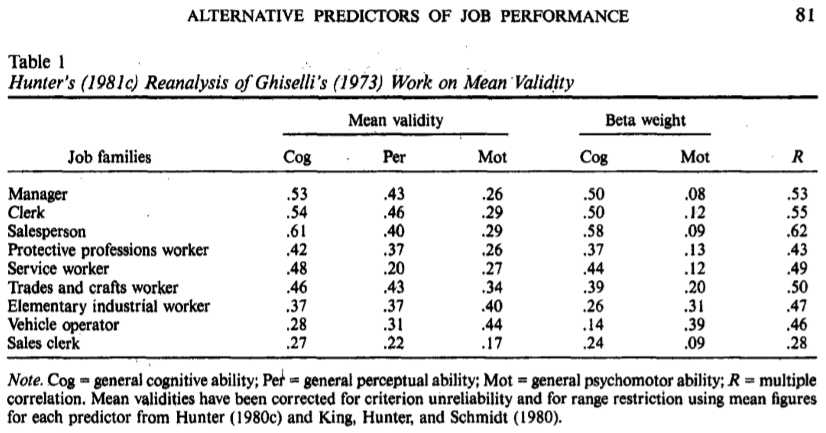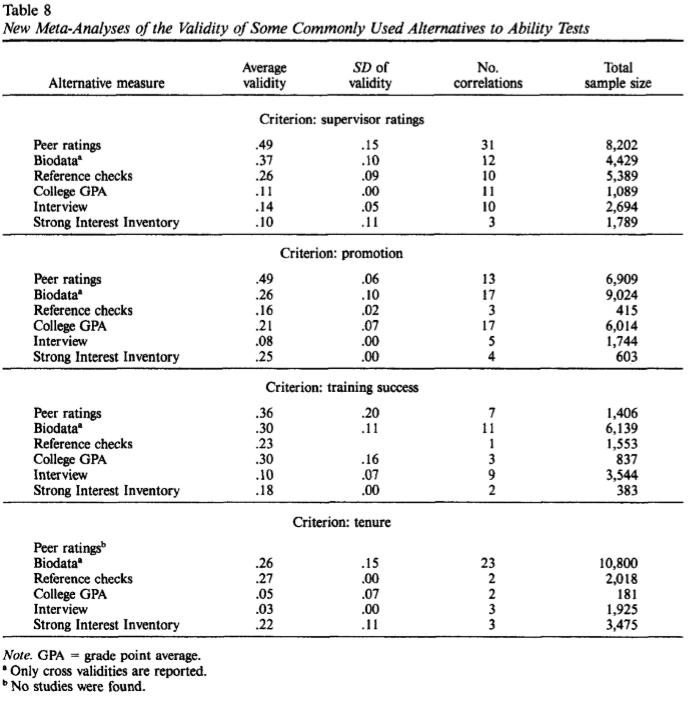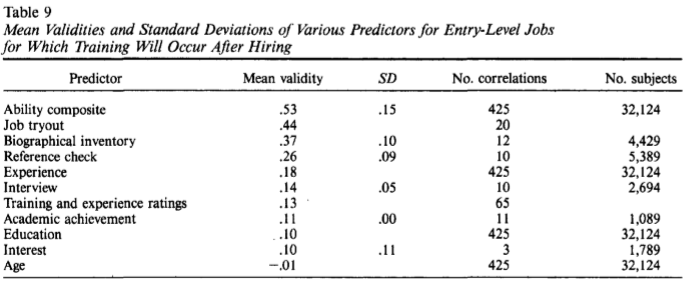Hiring is a complicated problem today, more complicated today than ever before and especially in states with stiffer worker regulations. Any hiring manager knows the damage bad hires can do and takes a low risk approach. But what candidate factors correlate to a successful candidate the closest?
There are several published studies on this so I'll be looking at a meta analysis. Hunter and Hunter 1984 (PDF) They examined a few thousand studies and normalized the results. I'll be touching on the high points and not generating my own data analysis for this article. What I'm picking out is a small sample of the interesting conclusions and providing some analysis.
The main argument of the study is how strongly Ability Testing compares to other predictors of job performance. Ability Testing is understood to be general cognitive tests. Before I show some actual numbers I should give a refresher on correlation coefficients which the numbers here represent. The range is generally [-1,1] with a 0 implying no correlation whatsoever. A 1 is associated with perfect positive correlation and -1 indicates perfect negative correlation. When studying two variables, a poor correlation of [-.2,.2] can often be termed a weak correlation. This frequently depends on the science discipline with social sciences often having to settle for accepting weaker correlations as significant.
Here is my opinion on correlation coefficients.
| Correlation | Rating |
|---|---|
| 0.0 - .10 | no correlation to negligible |
| .10 - .20 | minor |
| .20 - .40 | some |
| .40 - .60 | moderate |
| .60 - .80 | strong |
| .80 - 1.0 | High to perfect correlation |
Alright now for some tables. This table looks at Ability Testing as a predictor in performance for various job types. So we see general cognitive ability (Cog) most strongly predicts success for Salespersons, Clerks and Managers; correlations of .61, .54 and .53 respectively. The other two categories look at Perceptual and Psychomotor ability and offer lower correlations.

The next table looks at specific groups of Ability Tests, pay special attention to Group 2 and Group 3. Group 2 corresponds to cognitive tests associated with entry level positions which will offer training. Group 3 corresponds to an experienced worker group. The strongest predictor remains the general cognitive ability, referred to in this table as GVN. For Group 2 it correlated at .50 and Group 3 a .57.

So far we've learned ability testing that measures general cognitive ability is the strongest predictor of ability testing. Now that we know the best ability testing can offer, we can compare it to other studied predictors of job performance.
This next table studies predictors for positive supervisor ratings, promotion, training success and tenure. Since it is a large table and overly detailed to my central point I'll put it in a drop drown.
 Some insights: college GPA is important for predicting training success, but drops down dramatically for predicting promotion and positive evaluation by supervisors. Interview success has a minor correlation with success in any category. Of all predictors, peer evaluations did the best job of predicting success with correlations of .49 for supervisor ratings and promotion, but .36 for training success. This makes sense because peer evaluations have a lot to do with determining supervisor ratings and promotion. Reference checks provide some correlation across all categories. Biodata was the 2nd best predictor.
Some insights: college GPA is important for predicting training success, but drops down dramatically for predicting promotion and positive evaluation by supervisors. Interview success has a minor correlation with success in any category. Of all predictors, peer evaluations did the best job of predicting success with correlations of .49 for supervisor ratings and promotion, but .36 for training success. This makes sense because peer evaluations have a lot to do with determining supervisor ratings and promotion. Reference checks provide some correlation across all categories. Biodata was the 2nd best predictor.
What is Biodata? Biographical data about the candidate. This meta analysis reserves some criticism for this measure. Some issues noted are the tendency of Biodata to be adjusted to keep track of whichever keys did a good job of improving correlation but dropping keys which bring the correlation down. What keys are tracked depend on the study but some keys include held credentials and leadership positions held. A further observation is Biodata experiences a correlation decay in that the correlation drops dramatically over time to almost no correlation in a longitudinal study. In other words biodata that indicated a candidate would be a great hire does so accurately only on a near term basis. As time goes on the prior accomplishments of a candidate has almost no relation to their success later on.
Now to put it all together. This final table lists predictors ranked by correlation for entry level jobs where training will occur after hire.

We see here the results of the meta analysis looking at thousands of studies and organizations. The top predictor is Ability Testing with Job Tryout also providing moderate correlation to success. Biographical data and reference checks provide some correlation. Experience, Interviews, Training and experience ratings and Academic achievement provide minor correlation. Education and Interest provide negligible correlation. Age has no correlation.
Does this mean you should give someone a general cognitive ability test and if they score high enough let them trial the job? Not necessarily. While the other indicators are weaker they probably act as a gateway to allow someone to be evaluated for what truly predicts job success. However in a pool of similarly qualified candidates perhaps with disparate backgrounds, the decider could be cognitive ability tests.
Now for the wildcard strategy. If a company doesn't have a budget that can afford candidates from top schools with high GPAs or those with a strong record of leadership and accomplishments, hiring on behavioral background, high Ability Testing and on a contingent basis might get them the industry busting talent other companies overlook. Moneyball in the business world.
Another idea is hiring someone of any age, with either too much or too little education and little interest for the job could still result in a successful hire. Hiring someone from a top ranked school with high achievement in academics and extra-curriculars who gives a fantastic interview and has all the perfect experience could still turn out to be unsuccessful if they lack strong references and do poorly on general ability testing.
Thanks for reading.
Comments
There are no comments yet.